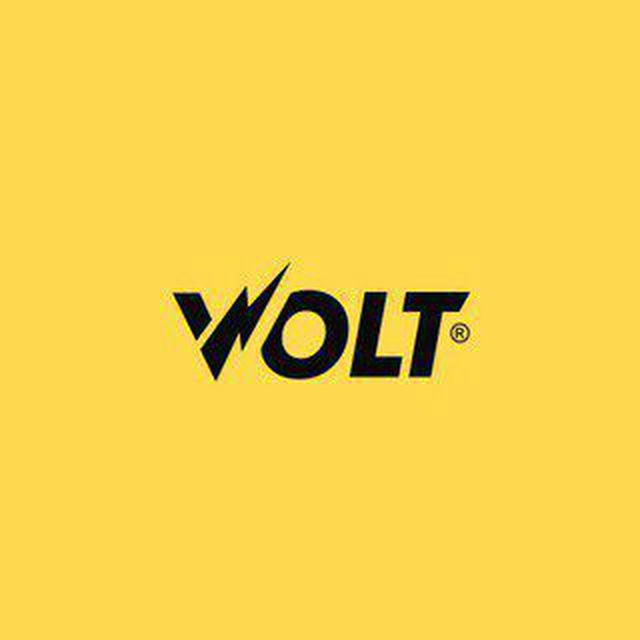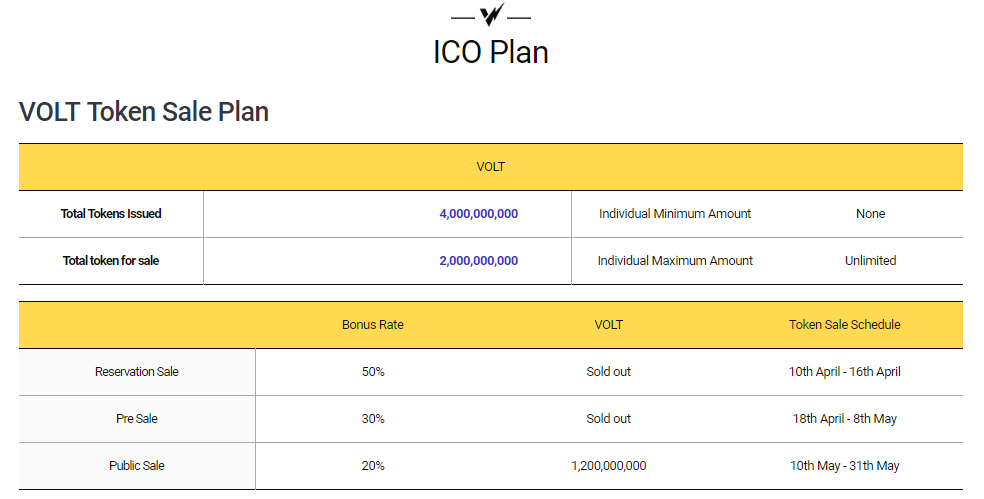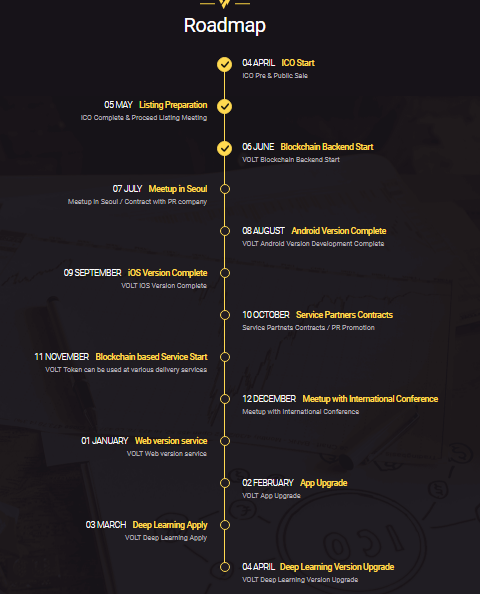VOLT Transparent and Safe Decentralized P2P Delivery System
VOLT Transparent and Safe Decentralized P2P Delivery System

Volt - Today is a digital era where all work is done instantly and not everyone wants to waste time doing less important things.
VOLT is a platform that allows centralized platforms such as Uber to be developed in a decentralized manner and allows direct delivery through P2P. Uber and other models play a central control role as intermediaries and receive a rate of 20% or more. The direct P2P model of VOLT is an efficient model that aims to eliminate brokerage fees by reducing direct costs to customers and couriers, less than 5%, or even hoping to eliminate it altogether.
The existing delivery model is a centralized model, with a system called Hub & Spoke. This centralized model, which includes DHL, has dominated the delivery market throughout the world. However, the centralized model can not meet the needs of the same day delivery. VOLT is a P2P delivery model based on blockchain that resolves the same day delivery limitation more than existing models.
Even today, Seseorag is too busy to buy, and the only way is to rely on online shopping.
And to buy online, of course, the product delivery service is required to reach the destination.
However, the problems that exist today in most delivery service markets, such as service price estimates, delivery speed limitations and existing quality, do not coincide with the expectations of the majority of people.
Volt Platform solutions
To solve all the problems mentioned above, the Volt platform is developed.
Simply Volt is an enhanced platform in a centralized delivery platform that exists, like UBER, to allow direct delivery of P2P.
The P2P model allows the messaging service and the client to communicate directly without intermediaries, so it will reduce costs by less than 5%.
The concept of the VOLT core is 3 parts that will be unified in 1 platform that is VOLT.
- Decentralization - VOLT is a decentralized platform. There are no intermediaries, which leads to lower prices for customers, while couriers get the maximum benefit.
- Transparency: transparency is what VOLT strives to offer. All customers and couriers, or shipping companies, benefit from privacy and transparency of costs and expenses.
- Security: a secure payment system that allows two P2P entities to confirm that they send and receive money retained in Token VOLT until after successful exchanges of services between the parties.
How does Volt work?
The business model of VOLT connects clients and messengers, and provides customized algorithms that use Big Data and an adequate system that uses intelligent contracts to facilitate the delivery of services. Customers need VOLT coins to use this service.
The business model of VOLT connects clients and messengers, and provides customized algorithms that use Big Data and an adequate system that uses intelligent contracts to facilitate the delivery of services. Customers need VOLT coins to use this service.
When the delivery of food, goods, shipping distance, time taken, taking into account the weight of the goods will be determined according to the amount of work difficulty. This unit of work is called "Jula".
For example, if the client wishes to send the item to a point called 2 km away and needs 600 Jula, and 1200 Jula is required to send the same item to point B 6 km away. VOLT is developing an optimal algorithm to calculate this amount of work and will introduce the lowest auction system (auction) for some special shipments.
VOLT coins are required for service buyers to request delivery. That is, to request a performance from Jula, the corresponding VOLT currency is used. This proportion of Jula to VOLT coins is not always constant. The first ratio of Jula coins to VOLT starts at 1: 1. The ratio can change according to the market price.
Review for Volt platform
I review this review from my own observations about VOLT who will support ICO.
Volt is already listed on coinschedule.com, which is the best site I've ever known to determine which ICO will be a success or a scam.
And VOLT in itself is included in the list of gold and also in confidence B, it means that the project has more value and more confidence than other projects.
How does it work ?
The business model of VOLT connects clients and messengers, and provides customized algorithms that take advantage of Big Data and a system that combines that uses intelligent contracts to facilitate the delivery of services. Customers need a VOLT currency to use this service.
When the delivery of food, goods, shipping distance, time required, taking into account the weight of the goods will be determined according to the amount of work difficulty. We call this unit of work "Jula". For example, if customers want to send the goods to a point called 2 km away and need 600 Jula, and 1200 Jula is required to send the same goods to point B 6 km away. VOLT is developing an optimal algorithm to calculate the amount of this work and will introduce the lowest bid (auction) system for some special deliveries.
A VOLT currency is required for a service buyer to request delivery. That is, to request a certain amount of Jula performance, a VOLT coin corresponding to this is used. The relation of this Jula to the currency VOLT is not always constant. The ratio of the first currency from Jula to VOLT starts at 1: 1. The ratio is variable according to the market price.
The business model of VOLT connects clients and messengers, and provides customized algorithms that take advantage of Big Data and a system that combines that uses intelligent contracts to facilitate the delivery of services. Customers need a VOLT currency to use this service.
When the delivery of food, goods, shipping distance, time required, taking into account the weight of the goods will be determined according to the amount of work difficulty. We call this unit of work "Jula". For example, if customers want to send the goods to a point called 2 km away and need 600 Jula, and 1200 Jula is required to send the same goods to point B 6 km away. VOLT is developing an optimal algorithm to calculate the amount of this work and will introduce the lowest bid (auction) system for some special deliveries.
A VOLT currency is required for a service buyer to request delivery. That is, to request a certain amount of Jula performance, a VOLT coin corresponding to this is used. The relation of this Jula to the currency VOLT is not always constant. The ratio of the first currency from Jula to VOLT starts at 1: 1. The ratio is variable according to the market price.
Token Flow
A client that requires administration can buy Exchange coins. A customer will buy 100 coins for the transportation benefit that costs 100 coins. The customer will pay 100 coins to VOLT where VOLT relates the demand to the dispatcher. Once the administration is finished, VOLT exchanges 95 coins to the dispatcher. About 5% (the rate can be changed according to the benefit of amplifying) of the currency is used as a commission for the benefit of the organization. The organization offers the currency earned to the exchange to generate income.
A client that requires administration can buy Exchange coins. A customer will buy 100 coins for the transportation benefit that costs 100 coins. The customer will pay 100 coins to VOLT where VOLT relates the demand to the dispatcher. Once the administration is finished, VOLT exchanges 95 coins to the dispatcher. About 5% (the rate can be changed according to the benefit of amplifying) of the currency is used as a commission for the benefit of the organization. The organization offers the currency earned to the exchange to generate income.
The income is used to maintain the organization or to give profits to the investors of VOLT, but not to the holders of the coins. In the event that this procedure undergoes a cycle, the request for the currency will inevitably be greater than the offer of the Exchange, which will generate a higher cost for the currencies. A combination of calculations and the current value of the currency, VOLT alters the currency / Jula rate. In the long term, the currency / Jula rate will increase, and along these lines you will be ready to own top Jula with 1 VOLT Coin. In addition, he subsequently constructs the Jula estimate.

VOLT Token sale plan
- Total Tokens issued: 4,000,000,000
- Total token for sale: 2,000,000,000
- Reserve sale: 200,000,000
- Presale: 600,000,000
- Public sale: 1,200,000,000
Exchange with other currencies will only be available after the sale of tokens ends.
Roadmap VOLT


Team and advisors volt
- Philip Lee (CEO)
Philip Lee is the CEO and founder of Volt Tech Ltd. He received his master's degree from UCLA. Philip has made Quick Quick an online and offline service company that reduces the cost of last mile delivery by implementing the Uber style delivery system. Currently, VOLT (brand: Quick Quick) is the largest last mile delivery service provider in Korea. - Sangchun Shim (CSO)
Dr. Sangchun Shim brought 30 years of experience from KT (Korea Telecom). He was known as the 'rainmaker' in KT; He has a management experience and has converted 55 affiliates from a total loss of $ 42 million to a profit of 140 million in just 2 years. Dr. Shim also led the successful acquisition, updated value and sale of "Kumho-Rent-Car". The company was acquired at a value of $ 300milion and sold to the Lotte Group at $ 1bilion in 2015. Dr. Shim received his MBA from George Washington University with a specialization in MSTI (Management of Science, Technology and Innovation) and PhD in Hanyang University. - Jieun Dino Lee (co-founder and board member)
Jieun Lee is a co-founder of QuickQuick (former brand of VOLT), and is currently a non-executive board member. She is also founder of LightUp, a service that provides a communication platform for consumers and companies to meet for social change. Jieun has worked for global investment banks such as Lehman Brothers, Credit Suisse and UBS as an intern to obtain their business skill sets. He graduated from the University of Michigan, specializing in Economics. - Gyeongrae Cho (Sales and Marketing Team Leader)
Mr. Cho is our VOLT sales team leader. Previously he worked with Haitai Group, Pantech and Nokia in business and sales analysis. With his knowledge in technology, he is specializing in industrial sales based on technology. He graduated from the University of Korea with a specialization in Engineering. - JaeWoo Lee (Advisor)
Mr. Jae Woo Lee is the co-founder and CEO of Vogo Fund Asset Management Co., widely known as the first private equity fund management company in Korea. Prior to co-founding Vogo in 2005, Mr. Lee was the CEO of Lehman Brothers Korea, where he created an important investment banking and capital market platform. Since starting his financial career at Citibank, he has spent the last 35 years in various fields of finance in Hong Kong and Seoul. Mr. Lee has chaired the Private Equity Association of Korea for several years and advised the Korean government as a member of the Financial Market Development Committee.
For more information:
- Website: https://volttech.io/
- Whitepaper: https://volttech.io/public/Final%20VOLT%20White%20paper%200410.pdf
- Ann Thread: https://bitcointalk.org/index. php? topic = 3285508.0
- Twitter: https://twitter.com/Volt_Technology
- Facebook: https://www.facebook.com/VoltTechnology1
- Instagram: https://www.instagram.com/Volt_technology
- LinkedIn: https: // www. linkedin.com/company/volttech/
- Medium: https://medium.com/volt-technology
- Youtube: https://www.youtube.com/channel/UCR1z3WNo2OR0y--SNEy1G3g
- Telegram: http://t.me/voltico
AUTHOR: Vionaa
My Bitcointalk Profile Link: https://bitcointalk.org/index.php?action=profile;u=1663173

Komentar
Posting Komentar